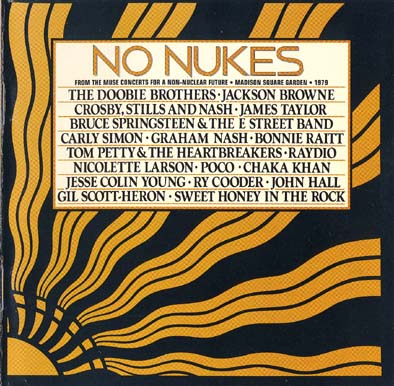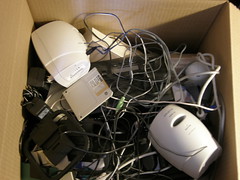
According to today's LA Times, Military embraces green energy, the US Army has discovered what we've been saying all along. Environmental management, including energy management, like all good management, saves money on the bottom line for businesses. Environmental and energy management is resource management. and resources cost money. If you can find ways to use fewer resources, partly by doing the job more efficiently, or by ensuring that the job you're doing is the right thing to do, you save money. If you find less expensive resources that do the (right) job just as well, then you've saved even more.
Of course sometimes you have to spend money to save resources in the long haul. I am getting really tired of reading that Obama's emphasis on renewable energy and carbon caps are going to cost us a lot more money. We're throwing money away hand and foot now, supporting wars and widows, orphans and mentally and physically ruining soldiers, all because we need oil from the mideast. We have a problem with people who can't pay mortgages because they lost their jobs, because it's too expensive to keep them in this country. What support we can give them also comes from tax-payer money. Carbon caps make traditional energy sources more expensive to provide an incentive to conserve energy with insulation, Energy Star houses, hybrid cars - just read more here in my blog, if you don't know what I'm talking about. It also encourages energy companies (or private businesses, citizens - and the military!) to install wind, solar, geothermal, hydro or other methods to avoid the high costs of conventional carbon-based energy. Once they're installed, they provide practically free energy, since their sources do not have to be renewed and they come (mostly) from the pretty undepletable energy of the sun.
Several years ago in September 2005 I attended the Sierra Club Summit in San Francisco. There I went to a fascinating meeting pairing Dave Foreman, co-founder of the radical EarthFirst and the more mature Rewilding, with, believe it or not, Marine Brigadier General Mike Lehnart from Camp Pendelton of the Marine Corps, who initiated a program to protect endangered species and perform environmental management on Marine bases. That was back when "environment" was things like habitat protection. But it was at the Sierra Summit that the Sierra Club decided to focus on sustainability and renewable energy (which my local chapter hasn't really caught up with.)
In the LATImes article you can read how the Fort Irwin army base in the Mojave Desert (not too far from here) has been going green for numerous reasons. By using insulated, sun reflecting tents they have got air conditioning costs (running generators) by up to 75%. By producing energy using wind, solar and geothermal sources, they figure they can soon be off the grid.
In the military, this doesn't just save money, it saves lives. In Iraq many lives have been lost among soldiers defending fuel transport convoys, which understandably are a popular target. If they can avoid the fuel entirely through conservation and locally generated energy, lives will be saved (as well as the costs of supporting widows and orphans, if you want to look at it cynically.)
As the article points out, the military (as well as the space program) have provided us with everything from Tang to cellphones to Hummers. Since the military is an enormous, its conversion to renewables will have a tremendous effect on our fuel needs, as well as the general attitude toward renewables.
Some in the green energy sector hope that as the military adopts alternative power sources, the technology will gain broader acceptance among political conservatives.
"Just hearing that their military is embracing this new technology that was thought of as left-of-center is going to swing people's thoughts" about using it, said David Melton, president of Albuquerque-based Sacred Power Corp., which installed some of Ft. Irwin's photovoltaic panels and wind turbines.





















